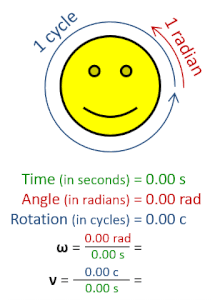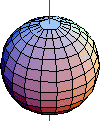కోణీయ పౌనః పున్యము

భౌతికశాస్త్రంలో "కోణీయ పౌనఃపున్యం" ω (కోణీయ అడి, రేడియల్ పౌనఃపున్యం, వృత్తారాక పౌనఃపున్యం, ఆర్బిటాల్ పౌనఃపున్యం, రేడియన్ పౌనఃపున్యం, పల్సేటన్స్ గా పిలుస్తారు) అనేది ఒక అదిశరాశి. ఇది భ్రమణ రేటును తెలియజేసే కొలత. ఇది ప్రమాణ కాలంలో జరిగిన కోణీయ స్థానబ్రంశంనూ తెలియజేస్తుంది. లేదా సిన్యుసోడియల్ యొక్కా దశామార్పురేటును కూడా తెలియజేస్తుంది.
కోణీయ పౌనఃపున్యం (లేదా కోణీయ వడి) సదిశరాశి అయిన కోణీయ వేగం యొక్క పరిమాణాన్ని తెలియజేస్తుంది. "కోణీయ పౌనఃపున్య సదిశ"ను ఈవిధంగా తెలుపుతారు.
(ఒమేగా) అనేది కోణీయ వేగాన్ని సూచించడానికి ఉపయోగిస్తారు.[1]
ఒక పూర్తి భ్రమణం 2π రేడియన్లకు సమానంగా ఉంటుంది. అందువల్ల [1][2]
where:
- ω అనునది కోణీయ పౌనఃపున్యం లేదా కోణీయ వడి (రేడియన్/సె లలో తెలుపుతారు)
- T అనునది పౌనఃపున్యం (వ్యవధి) ని సెకన్లలో తెలుపుతారు),
- f అనునది ఆర్డినరీ పౌనఃపున్యం (దీనిని హర్ట్స్ లలో తెలుపుతారు)
ప్రమాణాలు
[మార్చు]ఎస్.ఐ. ప్రమాణాలలో కోణీయ పౌనఃపున్యాన్ని సాధారణంగా రేడియన్లు/సెకన్లు లలో తెలుపుతారు. డైమన్షనల్ అనాలసిస్ లో దీని ప్రమానం "హెర్ట్జ్" అనుట కూడా సరియైనదే కానీ ఈ ప్రమాణాన్ని సాధారణ పౌనఃపున్యం యొక్క ప్రమాణంగా వాడుతారు.[3]
ఉదాహరణలు
[మార్చు]
భ్రమణ చలనం
[మార్చు]భ్రమణం చేస్తున్న వస్తువుకు, రేఖీయ వేగం, కోణీయ వేగం, వ్యాసార్థం మధ్య సంబంధం:
డోననాలు చేస్తున్న స్ప్రింగ్
[మార్చు]మూస:Classical mechanics An object attached to a spring will oscillate. Assuming that the spring is ideal and massless with no damping then the motion will be simple and harmonic with an angular frequency given by:[4]
where
- k is the spring constant
- m is the mass of the object.
ω is referred to as the natural frequency (which can sometimes be denoted as ω0).
As the object oscillates, its acceleration can be calculated by
where x is displacement from an equilibrium position.
Using 'ordinary' revolutions-per-second frequency, this equation would be
ఎల్.సి.వలయాలు
[మార్చు]The resonant angular frequency in an LC circuit equals the square root of the inverse of the product of the capacitance (C measured in farads) and the inductance of the circuit (L in henrys).[5]
ఇవి కూడా చూడండి
[మార్చు]మూలాలు , వనరులు
[మార్చు]- ↑ 1.0 1.1 Cummings, Karen; Halliday, David. Understanding physics. New Delhi: John Wiley & Sons Inc., authorized reprint to Wiley - India. pp. 449, 484, 485, 487. ISBN 978-81-265-0882-2.(UP1)
- ↑ Holzner, Steven (2006). Physics for Dummies. Hoboken, New Jersey: Wiley Publishing Inc. p. 201. ISBN 978-0-7645-5433-9.
- ↑ Lerner, Lawrence S. (1996-01-01). Physics for scientists and engineers. p. 145. ISBN 978-0-86720-479-7.
- ↑ Serway,, Raymond A.; Jewett, John W. (2006). Principles of physics - 4th Edition. Belmont, CA.: Brooks / Cole - Thomson Learning. pp. 375, 376, 385, 397. ISBN 978-0-534-46479-0.
{{cite book}}: CS1 maint: extra punctuation (link) - ↑ Nahvi, Mahmood; Edminister, Joseph (2003). Schaum's outline of theory and problems of electric circuits. McGraw - Hill Companies (McGraw - Hill Professional). pp. 214, 216. ISBN 0-07-139307-2.(LC1)
Related Reading:
- Olenick ,, Richard P.; Apostol, Tom M.; Goodstein, David L. (2007). The Mechanical Universe. New York City: Cambridge University Press. pp. 383–385, 391–395. ISBN 978-0-521-71592-8.
{{cite book}}: CS1 maint: extra punctuation (link)







